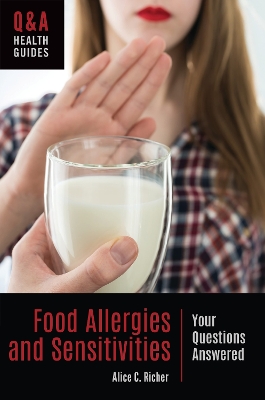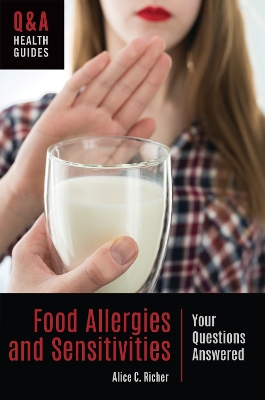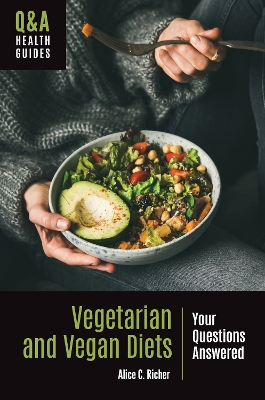Q&A Health Guides
3 total works
An easy-to-understand introduction to food allergies, sensitivities, and intolerances—unique but related conditions affecting many children and adults. The information, guidance, and resources offered make this a valuable tool for anyone struggling with negative reactions to certain foods.
While many people think that any negative reaction after eating a food indicates an allergy, that's not the case. True food allergies, along with more common food intolerances and sensitivities, can produce a wide range of symptoms, from unpleasant bloating to life-threatening anaphylactic shock. What causes these conditions, and how can they be treated or managed? Why are certain foods, like peanuts and milk, more problematic than others? Why are food allergies on the rise, and is this only a problem in the industrialized world?
Food Allergies and Sensitivities: Your Questions Answered, a part of Greenwood's Q&A Health Guides series, answers these and other questions related to this fascinating topic. Each book in this series follows a reader-friendly question-and-answer format that anticipates readers' needs and concerns. Prevalent myths and misconceptions are identified and dispelled, and a collection of case studies illustrates key concepts and issues through relatable stories and insightful recommendations. The book also includes a section on health literacy, equipping teens and young adults with practical tools and strategies for finding, evaluating, and using credible sources of health information both on and off the internet—important skills that contribute to a lifetime of healthy decision-making.
While many people think that any negative reaction after eating a food indicates an allergy, that's not the case. True food allergies, along with more common food intolerances and sensitivities, can produce a wide range of symptoms, from unpleasant bloating to life-threatening anaphylactic shock. What causes these conditions, and how can they be treated or managed? Why are certain foods, like peanuts and milk, more problematic than others? Why are food allergies on the rise, and is this only a problem in the industrialized world?
Food Allergies and Sensitivities: Your Questions Answered, a part of Greenwood's Q&A Health Guides series, answers these and other questions related to this fascinating topic. Each book in this series follows a reader-friendly question-and-answer format that anticipates readers' needs and concerns. Prevalent myths and misconceptions are identified and dispelled, and a collection of case studies illustrates key concepts and issues through relatable stories and insightful recommendations. The book also includes a section on health literacy, equipping teens and young adults with practical tools and strategies for finding, evaluating, and using credible sources of health information both on and off the internet—important skills that contribute to a lifetime of healthy decision-making.
While following a plant-based diet can provide many health and environmental benefits, vegetarians and vegans are at greater risk for certain nutritional deficiencies. They may also face challenges when grocery shopping, dining out, and interacting with friends and family.
More and more Americans are reducing or completely eliminating meat and other animal products from their diet. Some are motivated by concerns surrounding animal welfare and the environmental impact of meat, while others hope to improve their health by following a plant-based diet. Although a vegetarian or vegan diet can provide many benefits, it can also pose unique challenges and health risks.
Part of Greenwood's Q&A Health Guides series, Vegetarian and Vegan Diets: Your Questions Answered follows a reader-friendly question-and-answer format that anticipates readers' needs and concerns. Prevalent myths and misconceptions are identified and dispelled, and a collection of case studies illustrates key concepts and issues through relatable stories and insightful recommendations. Each book in the series also includes a section on health literacy, equipping teens and young adults with practical tools and strategies for finding, evaluating, and using credible sources of health information both on and off the internet—important skills that contribute to a lifetime of healthy decision-making.
More and more Americans are reducing or completely eliminating meat and other animal products from their diet. Some are motivated by concerns surrounding animal welfare and the environmental impact of meat, while others hope to improve their health by following a plant-based diet. Although a vegetarian or vegan diet can provide many benefits, it can also pose unique challenges and health risks.
Part of Greenwood's Q&A Health Guides series, Vegetarian and Vegan Diets: Your Questions Answered follows a reader-friendly question-and-answer format that anticipates readers' needs and concerns. Prevalent myths and misconceptions are identified and dispelled, and a collection of case studies illustrates key concepts and issues through relatable stories and insightful recommendations. Each book in the series also includes a section on health literacy, equipping teens and young adults with practical tools and strategies for finding, evaluating, and using credible sources of health information both on and off the internet—important skills that contribute to a lifetime of healthy decision-making.


